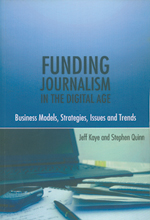Management
Book Review: How to make journalism pay
By China Daily (China Daily)
Updated: 2010-08-18 17:10
 |
Large Medium Small |
Newspapers in the West are in crisis. Readers are dropping like flies in a DDT storm. Advertising income has been
|
 READ IT
BOOK NAME: Funding Journalism in the Digital Age
Authors: Jeff Kaye and stephen Quinn
Publisher: Peter Lang AG
ISBN: 978-1-4331-0585-9
Page: 177
Price: 21.20 euros |
The reason, of course, was the arrival of the Internet age. For reasons best known to themselves, newspaper proprietors decided to greet this industrial revolution by putting their content online without charging for access. As such they unilaterally valued its worth as at worst zero or, at best, equivalent to the very low sums they were able to charge advertisers who now had millions of new places they could disport their wares.
The question then naturally arises, "Wherein lies the future of journalism?" Many regard the journalist as a bastion of democracy, able to challenge those in authority, to dig out key facts that embarrass the powerful. Without him or her, negotiating life's tricky decisions would become tougher and more treacherous.
The funding of journalism as we know it today in the new world order is not economically viable.
This is where authors and seasoned journalists Jeff Kaye and Stephen Quinn step in with their book Funding Journalism in the Digital Age.
In a clear and readable fashion they set out the predicament journalism has found itself in and explore the many ways it is trying to get out of it.
They look at ideas such as sponsorship and philanthropy, pay walls, niche and passion content and partnerships. What they conclude is that fundamental revolution if commercial journalism is to survive. "Other ways of funding journalism will have to be found," they write. "We believe that, through innovation, experimentation, collaboration, entrepreneurship and, probably, serendipity, they will be."